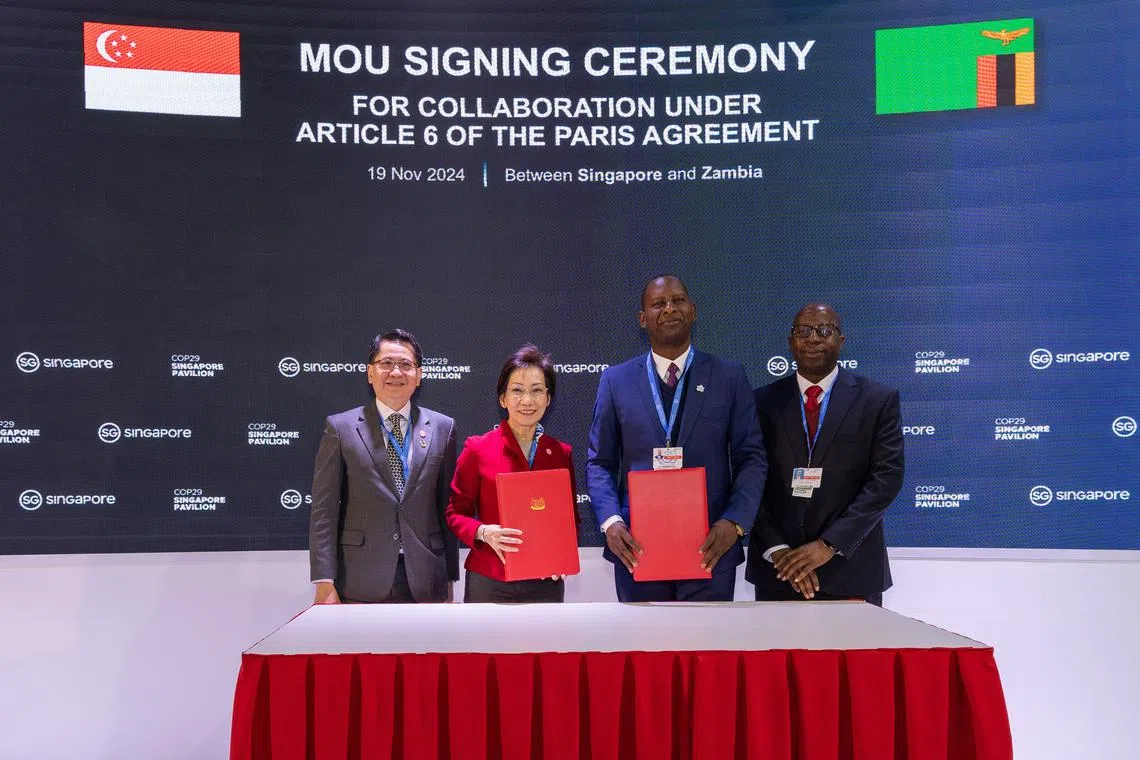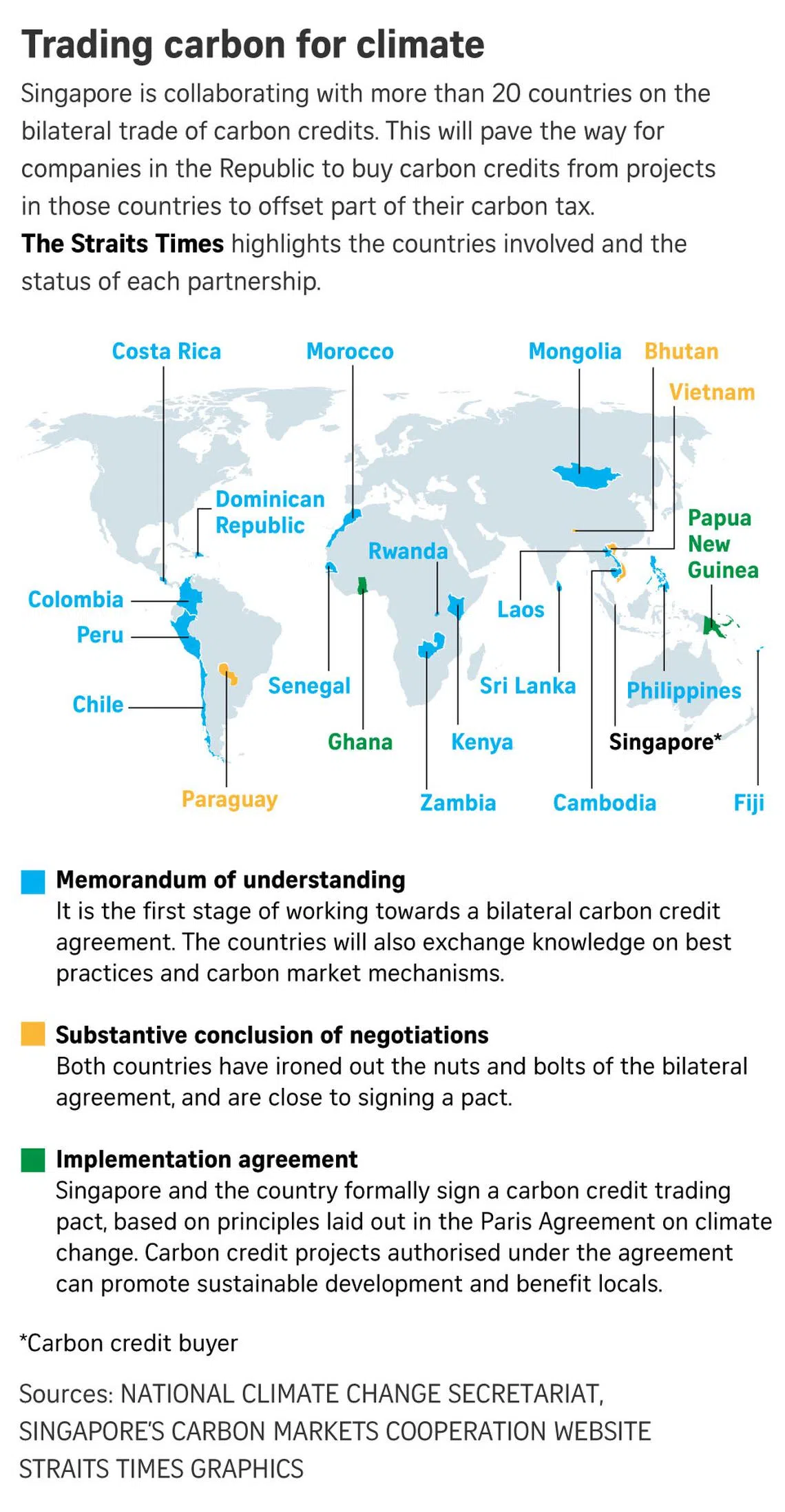Zambia, Singapore to collaborate on carbon credits
Sign up now: Get ST's newsletters delivered to your inbox

(From left) Permanent secretary for Sustainability and Environment Stanley Loh, Minister Grace Fu, Zambia’s Minister for Green Economy and Environment Mike Mposha and his permanent secretary Douty Chibamba.
PHOTO: COP29 SINGAPORE PAVILION
BAKU, Azerbaijan - The south-central African nation of Zambia on Nov 19 became Singapore’s newest partner in carbon credits, paving the way for future carbon trading that would help the island-state meet its climate targets while channelling finance to the landlocked African country.
A memorandum of understanding (MOU) was signed between Minister for Sustainability and the Environment Grace Fu and Zambia’s Minister for Green Economy and Environment Mike Mposha at the Singapore Pavilion of the UN climate change summit COP29 in Baku, Azerbaijan.
“Through our collaboration, both countries will share expertise and knowledge, unlock opportunities and financing for greater mitigation efforts and accelerate our low-carbon transition,” said Ms Fu.
With Zambia and Singapore, the ultimate aim of the agreement is for it to advance into a bilateral pact where cross-border carbon trading can occur in line with a segment of the Paris Agreement called Article 6.
In such a pact, known as an implementation agreement, Singapore can buy credits from carbon projects in Zambia to meet its climate change targets under the Paris Agreement.
Of the more than 20 countries Singapore is collaborating with on carbon markets, only two countries have advanced into implementation agreements with Singapore – Papua New Guinea and Ghana.
Once an implementation agreement is signed, carbon tax-liable companies in Singapore will be able to buy carbon credits from projects in partner countries to offset up to 5 per cent of their taxable emissions.
However, Singapore has not yet made any trades under this bilateral mechanism. In September, Singapore and Ghana announced a call for carbon projects.
Being alternative-energy disadvantaged, Singapore has limited options to decarbonise on its own. Buying credits and relying on emissions-cutting measures elsewhere, such as in Zambia, will offer Singapore alternative pathways to shrink its carbon footprint.
For Zambia, the development of carbon projects there will help to direct finances to sustainable projects. Local communities will also benefit in terms of job creation, access to clean resources, and better energy security.
Bilateral pacts are one of two ways countries can trade in carbon credits under Article 6.
In the second approach, emitter countries will be able to buy carbon credits through a UN-managed entity. This centralised global carbon programme was given the green light on day one of COP29 to begin operations, although observers told The Straits Times that it may take a couple of years before the first credits come online

Carbon markets are a form of innovative finance that could unlock new sources of funding for developing countries, Ms Fu told ministerial delegates at a separate high-level plenary on Nov 19.
In her delivery of Singapore’s national statement at COP29, she said: “We are working with partners to develop a well-functioning and credible carbon market... and building a pipeline of high-quality, high-integrity credits.”
Climate finance was a key topic in her statement as raising money to help developing countries fund climate action and reduce the impacts of floods and heatwaves is the key deliverable at this COP.
COP29 is dubbed as a “finance COP” as negotiators are expected to deliver an outcome on the new collective quantified goal for climate finance, which includes a new quantum of funds that developing countries should receive to help them take action to cut their emissions and protect their people from climate-change impacts.
There are a few options on the negotiating table, but some countries are looking at a fund of US$1.3 trillion (S$1.7 trillion) per year, with US$600 billion in grants.
In her speech, Ms Fu reiterated Singapore’s position on the climate finance goal, where only developed countries are obligated to contribute to the fund. While the island-state has a high GDP per capita, it is classified as a developing country in international negotiations.
As per the provisions of the Paris Agreement, Singapore is not obligated to contribute, but will voluntarily do so,
For example, Singapore announced on Nov 12 that it will commit up to US$500 million to a national initiative to channel financing to decarbonise Asia.
This funding will match, dollar for dollar, concessional capital from partners, including other governments, multilateral development banks and philanthropic institutions.
The US$500 million will be a major component of the national blended finance initiative, which aims to raise up to US$5 billion to finance green projects in Asia. Such projects include the early phase-out of coal power plants, the upgrading of electricity grid infrastructure and industrial decarbonisation efforts that are only marginally bankable.
“This will catalyse a much larger amount of private capital to support green and transition projects,” said Ms Fu of the initiative, called Financing Asia’s Transition Partnership (Fast-P).
“Singapore is fully committed to doing our part, in line with the Paris Agreement, to mobilise private capital towards supporting Asia’s transition,” she added.



